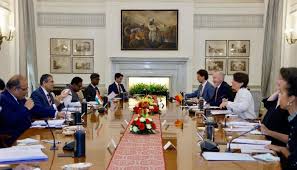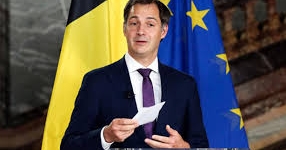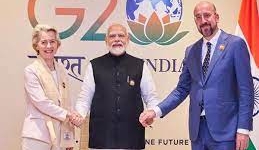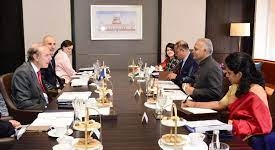-
LONDON: Indian-Origin Teen In UK Gets “Life-Changing” Cancer Treatment - 2 days ago
-
SILICON VALLEY: All About Pavan Davuluri, New Head Of Microsoft Windows - 2 days ago
-
LONDON: UK’s India Gate To Commemorate Role Of Indian Soldiers From World Wars - April 24, 2024
-
HARARE: Shri Bramha Kumar appointed as the next Ambassador of India to the Republic of Zimbabwe - April 23, 2024
-
LONDON: Indian-Origin Principal Wins UK Legal Challenge Over School Prayer Ban - April 23, 2024
-
TORONTO: Indian-Origin Doctor Needs ₹ 2 Crore For Legal Fees. Elon Musk Responds - April 22, 2024
-
KINSHASA: India-Democratic Republic of Congo Foreign Office Consultations - April 21, 2024
-
LONDON: UK Court Allows Sale Of Nirav Modi’s Luxury London Apartment - April 21, 2024
-
TEHRAN: Travel advisory for Iran and Israel - April 20, 2024
-
LUXEMBOURG: Shri Saurabh Kumar concurrently accredited as the next Ambassador of India to the Grand Duchy of Luxembourg - April 20, 2024
BRUSSELS : Pay via UPI, RuPay in Europe soon
BRUSSELS : Indian tourists in Europe will now be able to make payments using the Unified Payments Interface (UPI) and RuPay. The reason: Global payments firm Worldline has partnered with an arm of National Payments Corporation of India (NPCI) for payment acceptance from the Indian network.
Worldline, which is also present in India, has entered into an agreement with NPCI International Payments, or NIPL, which is the global arm of NPCI. Currently, customers from India pay through international card networks. UPI’s advantage over cards is that it allows multiple bank accounts to be accessed through one mobile application.
Facilitated via Worldline QR, the universal product for accepting all QR payments, the first target markets for NIPL are set to be Belgium, Netherlands, Luxembourg and Switzerland. There are further plans for expansion as Worldline QR is rolled out in Europe.
India is a key tourist market for Europe, with an estimated 10 million travelling to the region each year prior to Covid.























